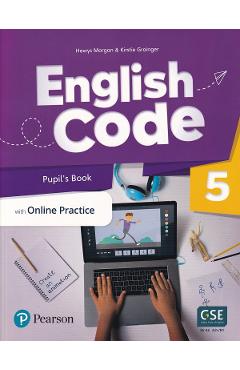English Code 5. Pupil\'s Book - Hawys Morgan, Kirstie Grainger

Detalii English Code 5. Pupil\'s Book
libris.ro
100.44 Lei
Manuale Carte Scolara
Kirstie Grainger
English Code 5. Pupil\'s Book - Disponibil la libris.ro
Pe YEO găsești English Code 5. Pupil\'s Book de la Kirstie Grainger, în categoria Manuale Carte Scolara.
Indiferent de nevoile tale, English Code 5. Pupil\'s Book - Hawys Morgan, Kirstie Grainger din categoria Manuale Carte Scolara îți poate aduce un echilibru perfect între calitate și preț, cu avantaje practice și moderne.
Caracteristici și Avantaje ale produsului English Code 5. Pupil\'s Book
- Departament: gaming-carti-birotica
- Ideal pentru pasionații de jocuri, birotică și distracție online.
Preț: 100.44 Lei
Caracteristicile produsului English Code 5. Pupil\'s Book
- Brand: Kirstie Grainger
- Categoria: Manuale Carte Scolara
- Magazin: libris.ro
- Ultima actualizare: 27-10-2025 01:24:43
Comandă English Code 5. Pupil\'s Book Online, Simplu și Rapid
Prin intermediul platformei YEO, poți comanda English Code 5. Pupil\'s Book de la libris.ro rapid și în siguranță. Bucură-te de o experiență de cumpărături online optimizată și descoperă cele mai bune oferte actualizate constant.
Descriere magazin:
English Code 5. Pupil\'s Book + Pupil Online World Access Code pack Learn English through hands-on creative tasks, investigation, projects and experiments with English Code. Children develop a coding mindset, problem solving, and collaborative skills. These all feature in a syllabus that includes built-in STEAM (Science, Technology, Engineering, Art, Math), driving learners\' natural curiosity about the world around them. A clear focus on functional language gives learners the tools to become effective and confident speakers of English inside and outside the classroom. What makes English Code special? • The coding mindset encourages students to experiment and teaches them resilience, collaboration and problem-solving from the domain of computational thinking. •Creativity helps students to develop their creative potential through hands-on activities, exposing students to a variety of arts, and encouraging students to think and work imaginatively. •STEAM lessons in each unit enables students to learn English through a subject: science, technology, engineering, art and design, and math (STEAM). This helps with engagement as well as enabling students to consolidate their knowledge across subjects. There are videos on each subject to extend the lesson. •Project-work inspires and focuses the learning from the very start, and gives students a sense of control and direction in their learning journey. •Critical thinking activities help students to develop their critical thinking skills by providing opportunities for students to collect and identify evidence, create arguments, identify strengths and weaknesses, and suggest opportunities for improvement. •Collaboration provides students with a variety of opportunities to develop their presentation and listening skills, and helps them build confidence in speaking English through engaging group activities. •The Global Scale of English is the source for the learning objectives, which are included in each unit in the Teacher\'s Edition across reading, listening, speaking and writing skills. Defining themes Creativity Creativity is the ability to use one\'s imagination and produce novel and useful ideas. Creative thinking is present in all aspects of life. Being able to apply creative thinking, students are more able to approach problems with resilience and apply innovative solutions. Cognitive strategies that support creative learning processes include brainstorming, problem-finding, reversing assumptions, and expanding on ideas to create new ones. STEAM Doing STEAM in the language classroom does not mean that learners stop engaging with language learning. On the contrary, scientists, engineers, technologists, artists, and mathematicians all need literacy and communication skills. STEAM and language learning fit very nicely together. It follows a CLIL (Content Language Integrated Learning) approach where students learn language through different subjects. - Sarah Hillyard, Teacher trainer, ELT consultant and author Coding A coding mindset is a willingness to experiment, an acceptance that you will make mistakes, an understanding that your improvement will not be linear, and knowing that perseverance will succeed. English Code develops students\' coding mindset by teaching life skills from the domain of computational thinking, for example, resilience, collaborative and problem-solving skills.

Produse asemănătoare
Produse marca Kirstie Grainger

English Code 5. Pupil\'s Book - Hawys Morgan, Kirstie Grainger
![]() libris.ro
libris.ro
Actualizat in 27/10/2025
100.44 Lei